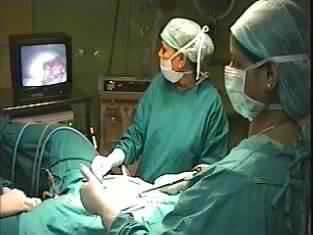What is Laparoscopic Supracervical Hysterectomy?
Laparoscopic supracervical hysterectomy is a procedure in which the upper section of the uterus is removed whereas the cervix of the female is left in its place. This is a partial hysterectomy treatment as opposed to ‘complete’ in which both the uterus and the cervix are removed.
This treatment method is employed for a number of reasons including fibroids, pelvic pain, endometriosis, infection in the ovaries, infection in the fallopian tubes, abnormal vaginal bleeding etc. Before going for this surgical procedure, one must remember that it has many side effects and certain risk factor associated with it.
The following is a detail of the side effects of laparoscopic supracervical hysterectomy:
Side Effects
- The obvious and most known side effect of a hysterectomy treatment is the loss of ability to reproduce. Loss of fertility is surely one of the biggest and most radical after effect of laparoscopic supracervical hysterectomy.
- One of the physical side effects of supracervical hysterectomy is excessive bleeding for a few days after the surgical process.
- Blood clots and infections are also likely to be caused due to laparoscopic supracervical hysterectomy treatment.
- A female may also get an infection of the urinary tract, which may even damage due to the surgery.
- Another possible side effect of laparoscopic supracervical hysterectomy is rectal damage and bladder damage.
- In some rare cases, early menopause may also be caused as a result of laparoscopic supracervical hysterectomy.
- Death if one of the rarest side effect or after effect of this treatment.
- It is a known fact that supracervical hysterectomy may lead to reduction in sexual desires and loss in sexual pleasure. But on the other hand, in a lot of cases, the sexual desire may increase or improve.
- One of the possible side effects of laparoscopic supracervical hysterectomy is hernia which leads to weakness of the muscle at the incision point.
- In some cases, the vaginal or abdominal incision may open and this may lead to a problem.
- Hysterectomy may also cause scar tissue which is basically a thicker tissue than normal skin which gets formed at the site of the surgery.
- Due to hysterectomy, females may experience blockage in the bowel or disturbed bowel movements. This may lead to abdominal pain, nausea, vomiting and bloating.
- Apart from these physical side effects, women may experience many emotional side effects as well. They may feel depression and low self-esteem due to removal of the reproductive part of the body.
photo credit: (www.ehow.com)



